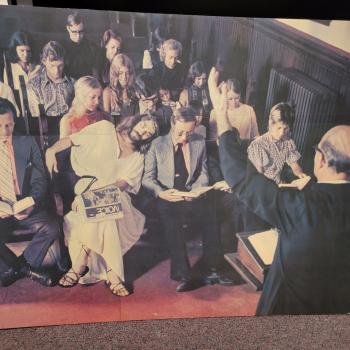In summing up recent trends in the assessment of the relationship of the Paul of the letters, and the Paul of Acts, Simon Butticaz in his article ” Has God Rejected his People (Rom. 11.1): The Salvation of Israel in Acts: Narrative Claim of a Pauline Legacy” (pp. 148-64) argues that “Modern research now appears to be firmly engaged in a third direction: locating the Paulinism of Luke between irrefutable proximity and noteworthy distance. In other words, the exegetes are increasingly convinced that neither the model of proto-catholic decline nor the model of harmonized continuity satisfactorily handles the Lukan reception of Paul.” (p. 151). This explains the shift from talking about falsification of Paul to the legacy and creative treatment of Paul.
Butticaz notes that various scholars have remarked on how “Luke, as also occurs in the Pastorals, closely associates Paul’s ministry and teaching. Furthermore, in both cases a profile of Paul the theologian is
formulated.” (p. 153). What is not even considered is the reason for such a parallel— namely Luke may well be the writer of the Pastorals, on behalf of Paul.
Butticaz seeks to make his own contribution to the discussion by clarifying what is meant by the ‘reception’ of Paul (and his writings). One critical and helpful point that he makes is that since we are dealing with two very different genre in the narrative of Acts vs. the discursive nature of letters, you cannot expect to make an adequate comparison of the two on the basis of mere verbal parallels, or the lack thereof. Put another way, Luke’s theology is developed and revealed through narrative, whereas this is not entirely true of Paul [he does have a narrative thought world out of which he does his theologizing however]. (p. 157).
Butticaz then undertakes to show how Luke takes Paul’s discussion about the fate of Israel in Rom., 9-11 and turns that into narrative dimensions of his account in Acts. The first point of contact is Paul’s use of the remnant concept to explain why the majority of Jews rejected their own messiah. In Paul’s view this was always part of the known plan, and in his view, Jewish Christians like himself make clear that God has not reneged on his promises to Israel, only they are fulfilled in true Israel, not more broadly in ethnic Israel writ large. Luke then tells a tale of the reject by many Jews and acceptance by some in his narrative. The church is not envisioned by Luke or Paul as the replacement for Israel, but rather as in continuity with true Israel. The “church does not rise on the ashes of the chosen people, but emerges from their historical and empirical extension” (p. 159). The threefold telling of Saul’s conversion then is the exemplum, showing how the salvation of the remnant of Israel emerges. Both Luke and Paul in Romans stress that the Good News is for the Jew first, and also the Gentile, with Luke making this clear from the modus operandi of Paul, reflected in whom he shares the Good News with first. (Acts 3.26; 13.46). There is a corollary to this. The Gentiles get the good news after the majority of Jews reject it, which corresponds with Paul’s discussion about the hardening of the majority of Israel, (and their breaking off temporarily) which allows for the ingrafting of the wild olive branches (aka the Gentiles). Acts 13.13-52, 18.1-11 and 28.16-28 all reflect this rejection by Jews, acceptance by Gentiles pattern. Both Luke and Paul see this matter eschatologically– the good news must be proclaimed to the ends of the earth, and the full number of Gentile must come in, fulfilling the Isaianic promise. Most Lukan scholars however have said that the final phrase about ‘turning to the Gentiles’ in Acts 28 passes a Lukan final judgment. There will be no eschatological bailout of non-Christian Israel in contrast to the reversal Paul envisions in Rom. 11.25ff. Butticaz says not so fast on this view in light of the pronouncements of salvation for Israel in Lk. 13.34-35; 21.24; Acts 3.21; cf. Acts 28.27b. Butticaz’ final conclusion is: “Luke proves to be very faithful in terms of rephrasing the Pauline legacy for a new historical situation…[but] the Pauline hope for the salvation of all Israel is reduced to a bare minimum in Luke.” (p. 164).

















